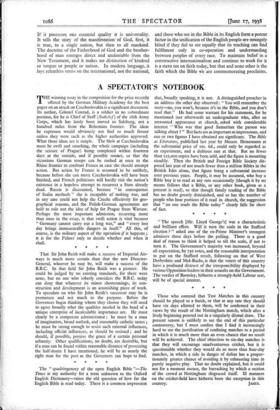A SPECTATOR'S NOTEBOOK
THE winning essay in the competition for the prize recently offered by the German Military Academy for the best paper on an attack on Czechoslovakia is a significant document.
Its author, Colonel Conrad, is a soldier in no subordinate position, for he is Chief of Staff (Stabchef) of the 18th Army Corps, which has lately been moved to Salzburg, not a hundred miles from the Bohemian frontier. The ideas he expresses would obviously not find so much favour unless they were such as the higher authorities approved. What those ideas are is simple. The bloiv at Czechoslovakia must be _swift and smashing, the whole campaign (including the seizure of Prague) being completed within fourteen days at the outside, and if possible sooner, so that the victorious German troops can be rushed at once to the Rhine frontier to confront France in case she should attempt action. But action by France is assumed to be unlikely, because before she can move Czechoslovakia will have been finished, and French politicians will hardly risk the nation's existence in a hopeless attempt to resurrect a State already dead. Russia is discounted, because " in consequence of Stalin methods " she is incapable of making war, and in any case could not help the Czechs effectively for geo- graphical reasons, and the Polish-German agreements are held to rule out the idea of help for Prague from Warsaw. Perhaps the most important admission, recurring more than once in the essay, is that swift action is vital because " Germany cannot carry out a long war," and " every lost day brings immeasurable dangers in itself." All this, of course, is the military aspect of the operation if it happens ; it is for the Fiihrer only to decide whether and when it shall.


















































 Previous page
Previous page